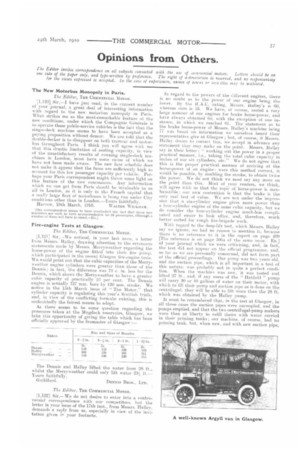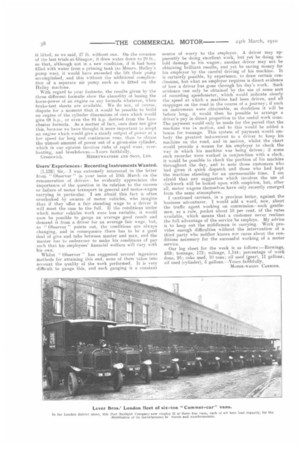Opinions from Others.
Page 17

Page 18

If you've noticed an error in this article please click here to report it so we can fix it.
The Editor invites correspondence on all subjects connected with the use of commercial motors. Letters hould be on
one side of the Paper only, and type-written by preference. The right of a)breviation is reserved, and no responswility for the views expressed is accepted. In the case 01 experiences, names of towns Or ioca dies may be withheld.
The New Motorbus Monopoly in Paris.
The Editor, THE COMMERCIAL Mount.
[1,120] Sir,-1 have just read, in the current number of your journal, a great deal of interesting information with regard to the new motorbus monopoly in Paris. What strikes me as the most-remarkable feature of the new conditions, under which the Compagnie GtInerale is to operate these public-service vehicles is the fact that the single-deck machine seems to have been accepted as a paying proposition without demur. We are told that the double-decker is to disappear on both tramcar and motorbus throughout Paris. I think you will agree with me that this drastic limitation of seating capacity, in view of the unsatisfactory results of running single-deck machines in London, must have some cause of which we have not been made aware. The new fare schedule does not make it appear that the fares are sufficiently high to account for this low passenger capacity per vehicle. Perhaps your Paris correspondent might throw sonic light on this feature of the new concessions. Any information which we can get from Paris should be invaluable to us all in London, as it is only in the French capital that a really lawe fleet of motorbuses is being run under City conditions other than in London.—Yours faithfully, Harrow, 19th March, 1910. WALTER WICKHAM.
(Our correspondent seems to have overlooked the fact that these new machines are each to have accommodation for Si pa,isengers, although a number of them will have to stand.—En.)
Fire-engine Tests at Glasgow.
The Editor, THE COMMERCIAL MOTOR.
[1,121] Sir, --We noticed, in your last, issue, a letter from Messrs. Halley, drawing attention to the erroneetts statements made by Messrs. Merryweather regarding the horse-power of the engine fitted into their fire pump. inch participated in the recent Glasgow fire-engine tests. We would point out that the cubic capacities of the Merryweather engine cylinders were greater than those of the Dennis; in fact, the difference was 70 c. in. less for the Dennis, which shows the Merryweather to have a greater cubic capacity of practically 10 per cent. The Dennis engine is actually 127 ram. bore by 130 aim. stroke. We notice in the 15th March issue of " The Motor." that cylinder capacity is regulating this year's Scottish trials, and, in view of the conflicting formulre existing, this is undoubtedly the fairest means to adopt.
As there seems to be some question regarding the pressures taken at the Mngdock reservoirs, Glasgow, we take this opportunity of giving the table which has been officially approved by the firemaster of Glasgow :— The Dennis and Halley lifted the water from 28 ft., whilst the Merryweather could only lift water 23!., It.— ours faithfully. Gnildford. DENNIS BROS., LTD.
The Editor, THE COMMERCIAL Moton.
[1,122] Sir,—We do not desire to enter into a eontroversial correspondence with our competitors. but the letter in your issue of the 17th inst., from Messrs. 'Talley. demands a reply from us, especially in view of the invitation given in your footnote. In regard to the powers of the eifierent engines, there is no aoubt as to the power of our engine being the lower. By the 1t.A.C. rating, Messrs. rialley's is 60, whereas ours is 3. We have, of course, tested a very large number of our engines for brake horse-power, and have always obtained 60, with the exception of one instance, in which we reached 61. The statement as to the brake horse-power of Messrs. Halley's machine being 77 was based on information we ourselves heard their representative give at Glasgow; but, of course, if Messrs. Halley desire to correct this, we accept in advance any statement they may make on the point. Messrs. Halley say in their letter: " working out the power in a proper practieal manner, i.e., taking the total cubic capacity in inches of our six cylinders, etc." IVe do not agree that this is the proper practical manner of arriving at the horse-power of an engine: were this method correct, it would be possible, by doubling the stroke, to obtain ta ice the power. We do not think we need say any more on the point than this. Most of your readers, we think, will agree with us that the topic of horse-power is inexhaustible; our own contention is that the brake is the
only real test of value. We are not under the impres sion that a six-cylinder engine gives more power than a four-cylinder engine of the saute cubic capacity, hut we do consider the four-cylinder engine much-less compli cated and easier to look after, and, therefore, much better suited for rough fire-brigade work.
With regard to the deep-lift test, which Messrs. Halley say we ignore, we had no reason to mention it, because there is no reference to it in the report on page 499 [The reference is on page 506a of the same issue. ED.] of your journal which we were criticising, and, in fact, the test did not appear on the official programme, and, so far as we are personally concerned, did not form part of the official proceedings. Our pump was two years old, and the suction pipe, which is all important in a test of this nature, was probably not in quite a perfect condition. When the machin9 was new, it was tested and lifted 27 ft., and, if any users of the " Hatfield " pump will carry 30 or 40 gallons of water on their motor, with which to fill their pump and suction pipe as is done on the centrifugal, they will be able to lift more than the 28 ft. which was obtained by the Halley pump.
It must be remembered that, in the test at Glasgow, in all three cases the suction pipes were imconpled, and the pumps emptied, and that the two centrifugal-pump makers were then at liberty to refill theirs with water carried in their priming tanks; our machine, of course, had no printing tank, lint, when new, and with new suction pipe,
it lifted, as we said, 27 ft. without one. On the occasion of the last trials at Glasgow, it drew water down to 29 ft., so that, although not in a new condition, if it had been filled with water from a priming tank (as Messrs. Halley's pump was), it would have exceeded the lift their pump accomplished, and this without the additional complication of a separate air pump such as is fitted on the Halley machine.
With regard to your footnote, the results given by the three different fermuhe show the absurdity of basing the horse-power of an engine on any formula whatever, when brake-test sheets are available. We do not, of course, dispute for a moment that it would lie possible to build an engine of the cylinder dimensions of ours which would give 68 h.p., or even the 84 h.p. derived from the laincheater formula. As a matter of fact, ours does not give this, because we have thought it more important to adopt an engine which would give a steady output of power at a low speed fur long and continuous runs, than to obtain the utmost amount of power out of a given-size cylinder, which in our opinion involves risks of rapid wear, overheating, and breakdowns.—Yours faithfully, Greenwich. MERRYWEATDER AND SONS, LTD.
-Users' Experiences: Recording Instruments Wanted.
[1,123] Sir,—I was extremely interested in the letter from " Observer " in your issue of 10th March on the _remuneration of drivers: he evidently appreciates the importance of the question in its relation to the success or failure of motor transport in general and motor-wagon carrying in particular. I am afraid this fact is often overlooked by owners of motor vehicles, who imagine that if they offer a fair standing wage to a driver it will meet the ease to the full. If the conditions under -which motor vehicles work were less variable, it would -soon be possible to gauge an average good result and • demand it from a driver for an average fair wage, but, -as " Observer " points out, the conditions are always changing, and in consequence there has to be a good deal of give and take between master and man, and the -master has to endeavour to make his conditions of pay such that his employees' financial welfare will vary with his own,
Whilst " Observer " has suggested several ingenious .methods for attaining this end, none of them takes into account the quality of the work performed. It is very difficult to gauge this, and such gauging is a constant
source of worry to the employer. A driver may apparently be doing excellent work, but yet be doing untold damage to his wagon; another driver may not, be obtaining brilliant results, and yet be saving money for his employer by the careful driving of his machine. It is certainly possible, by experience, to draw certain conclusions, but what an employer requires is direct evidence of how a driver has gone through his day's work. Such evidence can only be obtained by the use of some sort of recording speedometer, which would indicate clearly the speed at which a machine had been driven, and all stoppages on the road in the course of a journey; if such an instrument were obtainable, as doubtless it will be before long, it would then be possible to arrange a driver's pay in direct proportion to the useful work done. The payment would only be made for the period that the machine was in 'motion, and to this would be added a bonus for tonnage. This system of payment would embody the greatest inducement to a driver to keep his machine on the road, and in motion, whilst the chart would provide a means for his employer to check the way in which his machine was being driven; if some such recorder were worked in conjunction with a clock, it would be possible to check the position of his machine throughout the day, and to note those customers who had given it quick dispatch and those who had kept the machine standing for an unreasonable time. I am afraid that any suggestion which involves the use of clockwork will be looked upon with suspicion, but, after all, motor wagons themselves have only recently emerged from the same atmosphere.
cautioned carriers, in a previous letter, against the business adventurer. I would add a word, now, about the traffic agent working on commission--such gentlemen, as a rule, pocket about 10 per cent. of the rates available, which means that a customer never realizes the full advantage of the service he employs. My advice is to keep out the middleman in carrying. Work provides enough difficulties without the intervention of a third party who neither knows nor cares about the conditions necessary for the successful working of a motor service.
Our log sheet for the week is as follows :—Earnings, £63; tonnage, 172; mileage, 1,144; percentage of work done, 95; coke used, 10 tons; oil used (gear), 11 gallons; oil used (cylinder), 5 gallons.—Yours faithfully,
MOTOR-WAGON CARRIER.






















